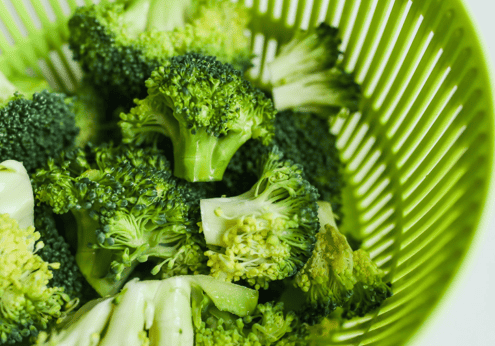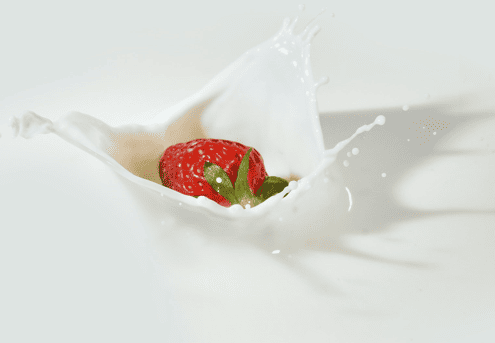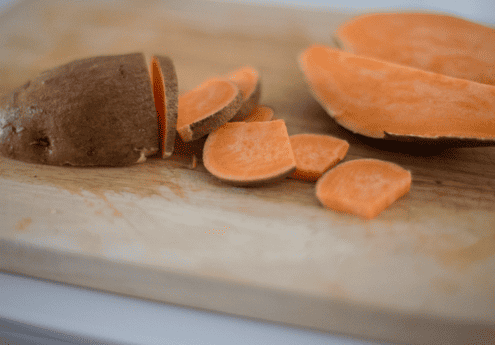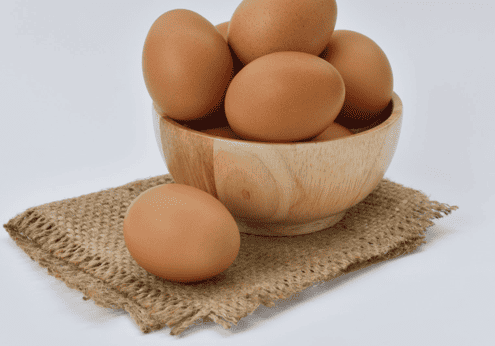4 Essential Fermented Foods for Optimal Gut Health
in Health & Nutrition, Kid's Health, Uncategorized10 Ways to Properly Nourish Your Body
in Beverages & Drinks, Food Business, Health & Nutrition, Kid's Health, UncategorizedDiet for Hypothyroidism: What are the foods to eat and avoid?
in Health & Nutrition, Kid's Health, UncategorizedNutriFusion® 2021: Natural Plant-Based Vitamins & Minerals
in Corporate Partnerships, Corporate Updates, Featured, Food Business, Food Retail, Health & Nutrition, Media Coverage, News, Press Releases, Product Announcements, Uncategorized8 Best First Foods for Babies
in Food Business, Health & Nutrition, Kid's Health, UncategorizedYour baby is growing up every day. World Health Organization recommend to feed breastmilk for six months, and later introduce family foods. As a mother, you are worried about your baby’s health and want to give him/her proper nutrition, right? Picking healthy food on the first bite is vital since healthy foods play a crucial role to ensure the baby’s proper nutrition.
We are going to share the best foods that contain vital nutrients for a growing baby. So, without wasting time let’s get started with their names and later describe the benefits of how they help on baby’s development.
Top 8 Best First Foods for Babies
- Egg.
- Broccoli.
- Yogurt.
- Sweet Potato.
- Green Beans.
- Banana.
- Squash.
- Apples.
Broccoli

Broccoli is an amazing food choice for your baby. This green veggie contains less cholesterol, produce vitamin D, helps remove detoxification, fight against inflammation and lot more. Broccoli is a highly recommended food for a 6 to 12 months old baby.
Yogurt

Yogurt is also tasty and healthy first food for babies. The yogurt is mostly made of cow milk and fruits. You can prepare homemade yogurt or you buy readymade yogurt from a grocery store. If you want to know more, check out the top 10 best yogurts for baby reviews.
The whole milk yogurts are made by bacterial fermentation of cow’s milk and it contains a lot of beneficial probiotics that improve baby’s diegetic capabilities. Also, yogurt is high in protein and calcium which helps to achieve stronger bones.
Moreover, research has shown yogurt improves blood sugar control and helps reduce cholesterol levels. We recommend dairy yogurt as the baby’s first food.
Green Beans

If you are serving green beans to your baby, he/she is getting a large number of essential nutrients which helps babies preventing from various disease such as common cold or flu, asthma, ear infection. Besides, the research found that green beans have potent health-supporting antioxidants to protect the baby from illness.
Banana

Bananas are pretty ideal baby food. Bananas are sweet, soft, and easy to swallow. Also, it is a great source of potassium and fiber. Bananas are very easy to prepare as baby puree, just peel and punch with fingers, that’s it!
Squash

Squash comes in a lot of varieties; it is highly delicious and the healthiest first food for the little ones. The squash has many variants such as Kabocha, Hubbard, Delicata, and Acorn are all part of winter squash. Winter squash benefits the blood sugar level, prevent the risk of cardiovascular disease and improve baby moods.
Sweet Potato

When it comes to baby’s first food, sweet potato comes at the top of the list. The nutritional value of a sweet potato is outstanding and the sweet taste makes ideal first food for babies. It contains vitamin C, minerals, potassium, vitamin E, calcium, and folate. Due to the high fiber content, it assists the digastric system and aid in regular bowel movements.
Egg

An egg is another healthy food for a baby’s health. The yolk of an egg contains choline which helps in a baby’s brain development and the white part is consists of protein which boosts the energy level of a baby.
Apples

Apples are cute and yummy. It is not only healthy first food for a baby but also it is easily digestible and possesses immunity-boosting nutrition. Besides, apple contains a large amount of polyphenols and phytonutrients which increase a baby’s immunity system which enables power to fight against infant illness and diseases. In addition, the apple carries soluble fiber which protects a baby from diarrhea and other stomach-related diseases.
Conclusion
These are the eight foods that are highly healthy for a baby when he/she start taking food for the first time. You must blend all baby foods before feeding them. Enjoy happy parenting!
Author Bio:
Hi, my name is Rakibul Niloy the creator of content for Family Smart Guide. I love to share my solutions to first-time mom who struggles and my goal is to share practical tips to survive and thrive of early motherhood days.
NutriFusion develops all‐natural fruit and vegetable powders that are nutrient dense. They are an excellent source of nutrition and can be added or mixed with the foods above.
Sourcing only whole, non-GMO foods, NutriFusion offers all ages a concentrated micronutrient and phytonutrient-rich food ingredient that blends easily. With a farm-to-table philosophy, NutriFusion’s proprietary process stabilizes the nutrients from perishable fruits and vegetables.
NutriFusion® blends are ideal for toddlers.
NutriFusion can help! Visit us at www.nutrifusion.com.
How to Snack and Prevent Diabetes
in Beverages & Drinks, Food Business, Health & Nutrition, Kid's Health, Uncategorized
Diabetes prevention is something we all should be working for, and your diet plays a huge factor in this. One often overlooked part of the conversation surrounding a healthy diet is snacking. While the obvious answer may seem to be to give up snacks altogether, depriving yourself of your favorite treats may not be the best protection from diabetes either. Below are a few ways to develop snacking habits that can reduce your chances of developing diabetes, as well as a few different foods to implement into your diet.
Avoid Glucose Spikes
Diabetes is characterized by having blood sugar levels that are unnaturally high due to insulin resistance. One of the ways that this insulin resistance can develop is by having spikes in your blood sugar that make it difficult for your body’s insulin to break down all of the glucose in the body. You can avoid these spikes by limiting consuming foods that quickly raise your blood sugar, such as sweets, starches, and processed foods.
Choose Your Snacks Wisely
Instead of choosing foods that are unhealthy in nature, try to focus on curbing your hunger with healthier options. Skip the donuts, cookies, and cakes and reach for fruits, vegetables, and nuts instead. Many adults struggle to meet their daily value of fruits and vegetables, so incorporating these foods into snack time can help you reach your nutritional needs.
There are certain foods that can help prevent diabetes more than others. Foods like apples and berries can satisfy your sweet tooth while carrots and pumpkin seeds can give you that crunch that you crave from chips and other salty snacks. Incorporating these foods into your snacking routine can help cut your risk of developing diabetes by minimizing spikes in blood sugar and preventing insulin resistance.
Space Out Your Snacks
While it might seem counterintuitive, snacking does have the potential to prevent blood sugar spikes from happening if eaten at the right times. When there is a large gap of time between meals, your blood sugar can dip, sometimes to dangerously low levels. This can result in extreme highs and lows that can make your body become less sensitive to its own insulin, ultimately leading to diabetes. Snacking can help prevent these highs and lows by keeping your blood sugar levels steady throughout the day because of the more consistent intake of nutrients. If you find yourself getting hungry throughout the day or if you know there is going to be a large gap between your meals, try keeping a snack nearby to help hold you over and stabilize your blood sugar.
Be mindful of your snacking
 While it may appear that snacking is purely a physical activity, the way that you snack is heavily tied to your emotional being as well. Unpleasant emotions like stress, anxiety, and depression can lead to overeating and cravings for those “comfort foods” that tend to be unhealthy in nature. And when it comes to emotional eating, you often won’t stop munching until you feel better, or until your body can’t physically take another bite. These snacking sessions can contribute to blood sugar spikes and insulin resistance because of the sheer volume and contents of the foods involved.
While it may appear that snacking is purely a physical activity, the way that you snack is heavily tied to your emotional being as well. Unpleasant emotions like stress, anxiety, and depression can lead to overeating and cravings for those “comfort foods” that tend to be unhealthy in nature. And when it comes to emotional eating, you often won’t stop munching until you feel better, or until your body can’t physically take another bite. These snacking sessions can contribute to blood sugar spikes and insulin resistance because of the sheer volume and contents of the foods involved.
A change in mindset can help prevent you from snacking mindlessly, as well as keep you from eating foods that are less healthy in nature. A great way to get a handle on your emotional eating is to first assess why it is that you’re tempted to start eating. Ask yourself— Are you really hungry? Are you upset? Are you avoiding something? If you realize that your cravings are originating from something other than hunger, try resisting the urge to snack for about 15 minutes to see if the feeling subsides. The more self-aware you become of your snacking habits, the better you’ll be able to fend off the development of diabetes.
Just 1 in 10 adults meet the federal fruit or vegetable recommendations, according to a study published today in CDC’s Morbidity and Mortality Weekly Report (MMWR). This report highlights that very few Americans eat the recommended amount of fruits and vegetables every day, putting them at risk for chronic diseases like diabetes and heart disease.
NutriFusion develops all‐natural fruit and/or vegetable powders that are nutrient dense for use in foods, beverages, supplements and pet foods.
NutriFusion can help! Visit us at www.nutrifusion.com.
America’s Snacking Habits Continue to Grow
in Uncategorized
Snacking is a favorite American activity, but many today are willing to sacrifice some things to get their snack products. Moonstruck Chocolate Co. contracted OnePoll to conduct a poll and found out some interesting facts:
- Americans spend about $9 a week for snacking habits, spending an average of about $479 annually, and a lifetime total of more than $28,000 throughout their lives for snacks.
- About 18% of Americans would stop using their mobile or electronic gadgets for a month for a chance at getting a lifetime snack supply.
- One-sixth of all Americans would have their heads completely shaved to have that snack supply.
Examining Favorite Snacks, Snack Combinations, and Food Preferences
The OnePoll research also focused on all portions of the market and industry facts for Moonstruck. The details found were:
- Around 37% of poll respondents wanted to snack on sweet items.
- 34% of these same respondents preferred their snacks salty.
- All respondent snackers had a common ground in potato chips.
- 84% of salty snackers preferred potato chips as a staple.
- 80% of sweet snackers preferred chips as stable snacks.
Here are further facts:
- The snackers all voted for having chocolate combined with snack goodies.
- Many were willing to experiment with unique, non-traditional taste and ingredient combinations, pizza and chocolate, like an apple pie with cheddar, and strawberries paired with balsamic vinegar.
- 40% preferred pairing chocolate with caramel.
- 39% preferred having nuts combined with chocolate.
Most preferred general pairings of non-snack foods, in order of preference, included:
- Eggs with bacon at a whopping 58%
- Potatoes with steak
- Dip with chips
- Syrup and pancakes
- Cheese with wine
What Other Food Companies or Researchers Found?
- Campbell
One company has found substantial evidence of how Americans are more dedicated to their snacking. The Campbell Soup Co. reports in the Wall Street Journal that in the last quarter of 2019, their sales reflected more of their snack products sold than their flagship food brands.
Soup sales declined 3% in the first quarter of 2019, as its snack products increased sales by 2% from the previous year. Campbell is currently planning to capitalize on American snacking habits while bolstering its traditional soup products with more investments.
- Innova
The competition is ramping up for the American snacking dollar. This is based on the findings of the research firm Innova Market Insights. They report that Americans have developed the habit of snacking all day at any given hour. Other interesting facts from Innova:
- A lot more consumers prefer quicker bites than traditional meals.
- 37% of consumers prefer salty snacks during the evening.
- 46% want their salty snacks in the afternoon.
- 17% replaced their dinner with salty snacks.
- 23% ate said snacks for lunch.
- 8% want these snacks instead of breakfast foods.
The Word is Out on American Snacking Habits
What all the facts enumerated in this article simply mean that snacks are either getting tastier, are more nutritious, can replace meals or a combination of all three factors. Major studies must be conducted to determine whether the poll and research results referenced are right, but most other signs support them.
Inspired by foodinstitute.com

NUTRIFUSION® CERTIFICATES

Categories
© Copyright 2024 NutriFusion LLC | All Rights Reserved.
